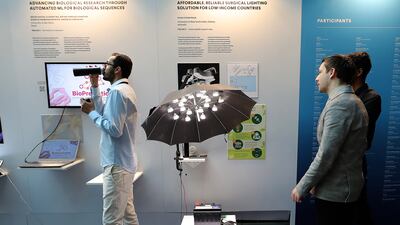Live updates: Follow the latest news on Cop28
From using palm trees to harness micro-winds and generate electricity to upcycling plastic waste into green materials, 100 projects developed by university students offering solutions to environmental and social issues have been on display at an exhibition in Dubai this week.
The 100 chosen projects, from 46 countries and 92 universities, have been visible at the Prototypes for Humanity exhibition at Emirates Towers – running from November 28 to 30.
A total prize of $100,000 will be awarded in five categories – nature and food; health and safety; energy efficiency; education; and data science and artificial intelligence-enabled solutions.
The award ceremony is scheduled for December 2 in Cop28’s Green Zone and will reward outstanding contributions with a share of the $100,000 prize money.
Tadeu Baldani Caravieri, founding director of Prototypes for Humanity, said the programme celebrated innovation from universities that had the power to change society and the planet for the better.
"The work we do is to celebrate academic innovation. We have a big showcase of innovation in Dubai every year and we also support the university students who want to take those solutions forward," Mr Caravieri said.
“The reason we started doing this almost 10 years ago is because we realised that what is being produced at universities and in research labs is, at times, not sufficiently acknowledged."
Mr Caravieri also gave particular praise to the efforts made by UAE universities in recent years.
“UAE universities are developing new frameworks for research, which is incredibly exciting," he added.
“We have always had very consistent participation from UAE-based students. Not only is the research of good quality, but the framework is very advanced.
"The universities in the region, some of them, are at the forefront of research when it comes to alternative sources of energy."
Thaier Alawadh from Saudi Arabia and Ahmed Elsayed from Egypt, both chemical engineering graduates at UAE University, created Tree 2.0, which is a mechanical tree designed to capture carbon dioxide from the air.
Their project is patent pending and is on show at the exhibition, which has run annually since 2014.
Tree 2.0 revolutionises carbon removal, processing 1.5 million cubic metres of air per tonne of carbon dioxide at a rapid 700 times absorption rate.
“We are capturing carbon dioxide from air on our device. The process itself is five to 10 times better than what is available on the market," Mr Alawadh said.
"There are so many companies that pay you in carbon credits, so we can sell the carbon dioxide to these companies.
"We are in the patent funding process and we're already approaching companies."
The 2023 edition of this exhibition, held in partnership with Dubai Future Foundation, will launch a new programme to bring together academic innovation, venture-building experts and industry partners to co-create viable solutions for environmental and societal problems.
A team of 13 at New York University Abu Dhabi created Precious Plastic, a solvent-free method of converting plastic bags and masks into stable carbon dots that dissolve in liquids, offering a solution to plastic waste.
Mohammed Abdelhameed, a researcher at NYUAD, said: "We convert plastic waste that includes plastic bottles, plastic bags, or masks into valuable products that will have more economic value."
These carbon materials at the nanoscale size are used in many applications. For example, they can be used in very small quantities in concrete to enhance its strength.
"During the Covid-19 pandemic, the main challenge we were trying to solve was that we were using a large number of masks globally. So we thought we needed to do something to change that," Mr Abdelhameed said.
"Since these masks are very similar in chemical structure to plastic bags and bottles, we expanded our experiments to include them as well. The process worked very well."
Mr Abdelhameed said that, if the team wins the prize money, they will use it to expand the scale of their experiments.












